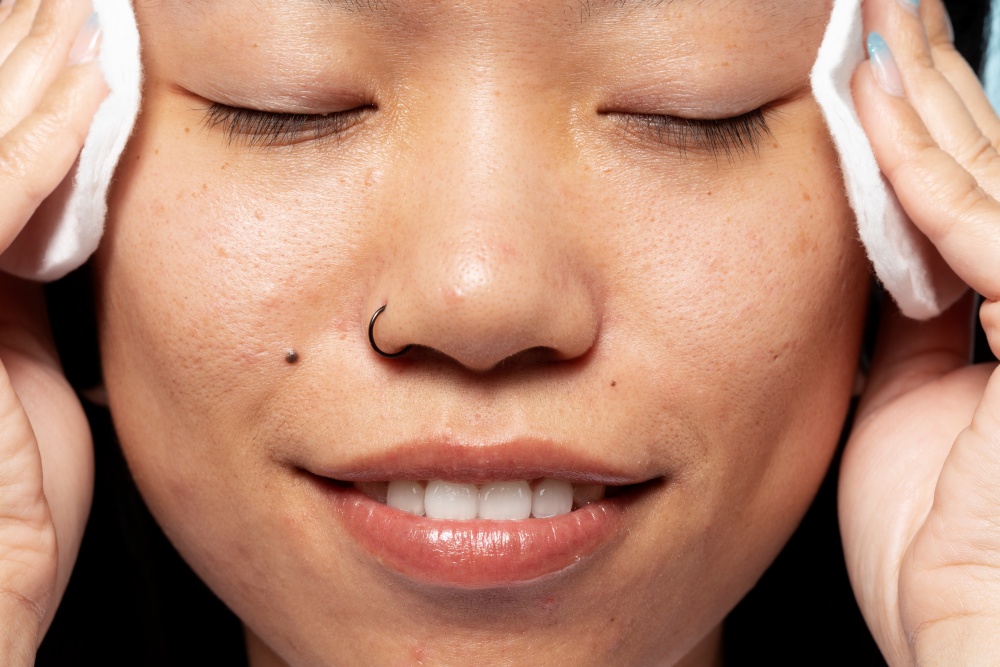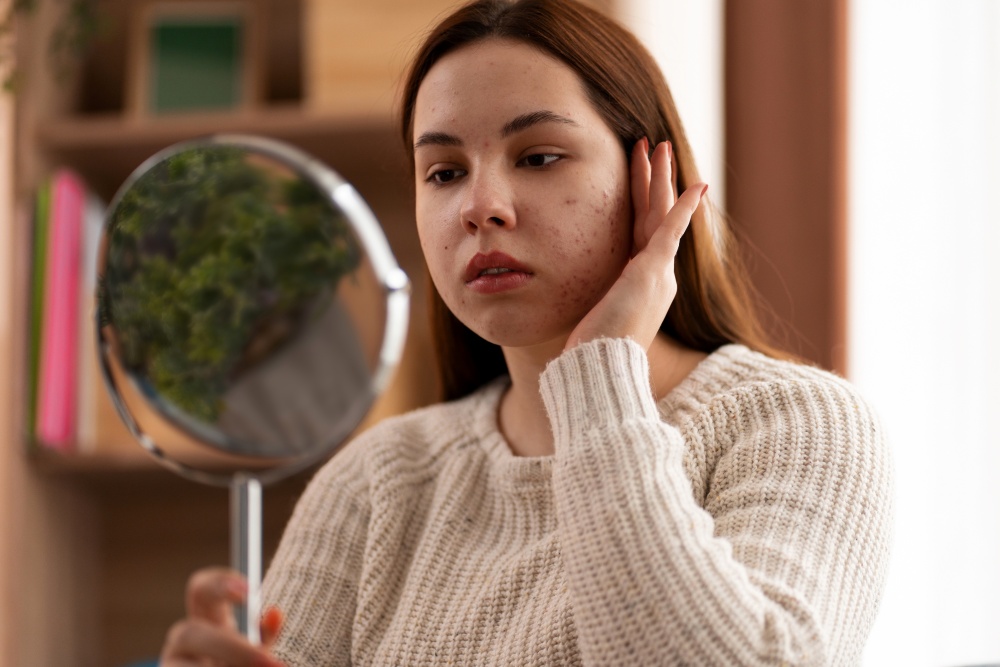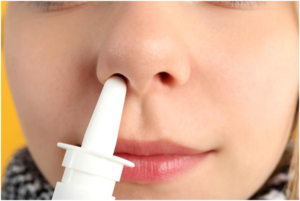Acne breakouts can be a frustrating and persistent challenge, no matter your age. As such, it comes as no surprise that many people turn to skincare as an ally in their quest for clearer skin, seeking solace and solutions in a myriad of products and ingredients.
However, whether you are a teenager navigating hormonal changes or an adult dealing with stress-induced flare-ups, finding the right skincare ingredients can feel like searching for a needle in a haystack. After all, choosing the right products is key to supporting your skin, managing those pesky breakouts and keeping those flare-ups at bay.
But what are the skincare ingredients that work with your skin, not against it?
1. Benzoyl Peroxide: The Bacteria Buster
Benzoyl peroxide is a common ingredient in the fight against acne. Its primary function is to reduce the bacteria on your skin’s surface, making it a go-to option for those with mild to moderate breakouts. It is available in various forms like gels, creams, lotions, face washes, and soaps, providing flexibility to suit your skincare preferences.
While generally safe for most adults and children over 12, benzoyl peroxide can sometimes cause skin irritation like dryness, redness, or peeling, especially when you first start using it. If you experience any of these side effects, try using the product less often before gradually building up the frequency as your skin becomes more tolerant.
While rare, more severe reactions like swelling or blisters can happen. If you experience these, stop using the product and consult a doctor. As with any skincare product, if you have concerns or pre-existing skin conditions, it is always a good idea to talk to a dermatologist before incorporating benzoyl peroxide into your routine.
2. Salicylic Acid: Exfoliation for Clear Pores
Beyond battling bacteria, another key strategy in managing acne-prone skin lies in keeping those pores clear and unclogged. This is where salicylic acid, a beta hydroxy acid (BHA), steps in as a valuable ally.
Salicylic acid’s exfoliating action helps to break down the build-up of dead skin cells and excess sebum that tend to clog up the pores and potentially lead to breakouts and blemishes. By penetrating deep into the pores, it may help prevent future breakouts, revealing a smoother and clearer complexion over time.
You will find salicylic acid in a range of over-the-counter products, from cleansers and toners to spot treatments and masks. For more stubborn or persistent acne, prescription-strength formulas are also available.
3. Alpha Hydroxy Acids: Skin Renewal and Inflammation Reduction

In addition to targeting bacteria and clearing pores, managing acne-prone skin also involves addressing inflammation and promoting skin renewal.
This is where alpha hydroxy acids (AHAs) come into play.
They work by gently exfoliating the skin’s surface, aiding with the shedding of dead skin cells that can contribute to breakouts. This process not only helps to prevent clogged pores but also reveals a fresher complexion.
Furthermore, AHAs possess anti-inflammatory properties that can help soothe redness and irritation. Additionally, they have been shown to promote blood flow to the skin. This increased circulation helps nourish skin cells with vital nutrients and oxygen, contributing to a healthier and more vibrant complexion.
Among the various types of AHAs used in skincare, glycolic acid (derived from sugarcane) and lactic acid (derived from lactose or other carbohydrates) are particularly well-researched and widely available in over-the-counter products. They offer an effective yet gentle approach to exfoliation and inflammation reduction, making them suitable for many individuals with acne-prone skin.
And the benefits of AHAs extend beyond just addressing acne. They may also help improve the appearance of fine lines and wrinkles, promote collagen production, and even out skin tone by addressing discolouration from scars and age spots.
4. Azelaic Acid: Nature’s Ally for Acne-Prone Skin
While we often turn to synthetic solutions for our skincare woes, nature has its own arsenal of ingredients to offer, and azelaic acid is a prime example. Derived from grains like rye, wheat, and barley, this naturally occurring acid is also produced by yeast found on healthy skin, hinting at its compatibility with our complexions.
This multi-faceted acid offers a range of benefits for those battling acne. First and foremost, it has antibacterial properties, directly targeting the bacteria that contribute to breakouts. Additionally, its antioxidant properties help shield the skin from free radicals, which can lead to inflammation and worsen acne.
Beyond its direct action against acne, azelaic acid also supports clear pores by helping to prevent clogs caused by a build-up of dead skin cells and oil. This, in turn, contributes to potentially less inflammation and a reduced likelihood of new breakouts. Moreover, azelaic acid can help fade dark spots (hyperpigmentation) and minimise redness associated with acne.
Azelaic acid is available in various forms, including prescription creams and gels to target acne and rosacea. Over-the-counter options like serums provide a convenient way to incorporate them into your skincare routine.
And as with any new product, it is advisable to start with a lower concentration and follow usage instructions carefully. While some initial side effects like mild burning or dryness are possible, these usually improve with time. But if you experience significant irritation, consult a dermatologist.
5. Vitamin C: Antioxidant for Acne-Prone Skin
Beyond the targeted actions of acids like salicylic and azelaic, incorporating antioxidants into your skincare routine can provide additional support in managing acne. Vitamin C, also known as ascorbic acid, is an antioxidant that may help address the inflammation and discolouration associated with breakouts.
Thanks to its anti-inflammatory properties, topical Vitamin C can help reduce redness and swelling, improving the overall appearance of acne lesions. It may also play a role in fading post-inflammatory hyperpigmentation (dark spots) by interfering with melanin production.
While you can obtain Vitamin C through your diet or supplements, skincare products formulated with this vitamin are considered more likely to help address acne-related concerns. So be sure to look for serums or creams containing Vitamin C as part of your comprehensive acne-fighting regimen.
For an extra boost of Vitamin C, consider Vitamin C pills or refreshing Japanese Vitamin C drinks like the Hakubi White C drink into your daily routine. These supplements can complement your topical skincare efforts and promote overall skin health from the inside out.
Remember, the journey to clearer skin is a personal one, and what works for one person may not work for another. It is essential to be patient, consistent, and listen to your skin’s needs. If you have any concerns, consult with a dermatologist or skincare professional to create a personalised regimen that supports your skin’s health and helps you achieve the confidence that comes with a clear complexion.
Take a step further with our collagen tablet to provide the essential nutrients your skin needs for better appearance. Our top Singapore collagen drink, the Hakubi collagen drink is also something that will make your time worth it!




